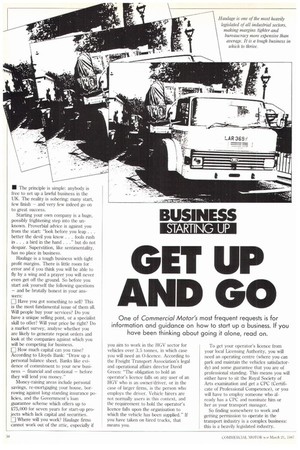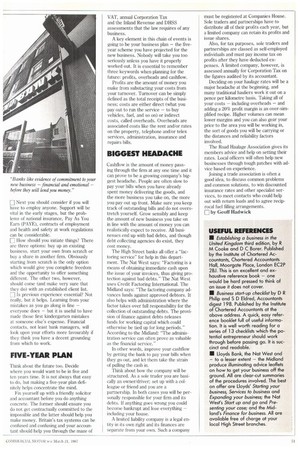GET up AND GO
Page 52

Page 53

If you've noticed an error in this article please click here to report it so we can fix it.
One of Commercial Motor's most frequent requests is for information and guidance on how to start up a business. If you have been thinking about going it alone, read on
• The principle is simple: anybody is free to set up a lawful business in the UK. The reality is sobering: many start, few finish — and very few indeed go on to great success.
Starting your own company is a huge, possibly frightening step into the unknown. Proverbial advice is against you from the start: "look before you leap . . . better the devil you know. . . fools rush in. . . a bird in the hand. . ." but do not despair. Superstition, like sentimentality, has no place in business.
Haulage is a tough business with tight profit margins, There is little room for error and if you think you will be able to fly by a wing and a prayer you will never even get off the ground. So before you start ask yourself the following questions — and be brutally honest in your answers: El Have you got something to sell? This is the most fundamental issue of them all. Will people buy your services? Do you have a unique selling point, or a specialist skill to offer? Will your price be right? Do a market survey, analyse whether you are likely to generate repeat orders and look at the companies against which you will be competing for business.
E How much capital can you raise? According to Lloyds Bank: "Draw up a personal balance sheet. Banks like evidence of commitment to your new business — financial and emotional — before they will lend you money."
Money-raising areas include personal savings, re-mortgaging your house, borrowing against long-standing insurance policies, and the Government's loan guarantee scheme which offers up to £75,000 for seven years for start-up projects which lack capital and securities.
Where will you work? Haulage firms cannot work out of the attic, especially if you aim to work in the HGV sector for vehicles over 3.5 tonnes, in which case you will need an 0-licence. According to the Freight Transport Association's legal and operational affairs director David Green: "The obligation to hold an operator's licence falls on any user of an HGV who is an owner/driver, or in the case of larger firms, is the person who employs the driver. Vehicle hirers are not normally users in this context, and the requirement to hold the operator's licence falls upon the organisation to which the vehicle has been supplied." If you have taken on hired trucks, that means you. To get your operator's licence from your local Licensing Authority, you will need an operating centre (where you can park and maintain the vehicles satisfactorily) and some guarantee that you are of professional standing. This means you will either have to sit the Royal Society of Arts examination and get a CPC (Certificate of Professional Competence), or you will have to employ someone who already has a CPC and nominate him or her as your transport manager.
So finding somewhere to work and getting permission to operate in the transport industry is a complex business: this is a heavily legislated industry. Next you should consider if you will have to employ anyone. Support will be vital in the early stages, but the problems of national insurance, Pay As You Earn (PAYE), contracts of employment and health and safety at work regulations can be considerable.
[I How should you initiate things? There are three options: buy up an existing business, start your own from scratch or buy a share in another firm. Obviously starting from scratch is the only option which would give you complete freedom and the opportunity to offer something different. The other two, however, should come (and make very sure that they do) with an established client list. El Is previous experience essential? Not really, but it helps. Learning from your mistakes as you go along is fine — everyone does — but it is useful to have made those first kindergarten mistakes at someone else's expense. Financial contacts, not least bank managers, will look upon your efforts more favourably if they think you have a decent grounding from which to work.
FIVE-YEAR PLAN
Think about the future too. Decide where you would want to be in five and ten years time. It is not always that easy to do, but making a five-year plan definitely helps concentrate the mind.
Fix yourself up with a friendly solicitor and accountant before you do anything concrete. The former should ensure you do not get contractually committed to the impossible and the latter should help you make money. Britain's tax systems can he confused and confusing and your accountant should help you through the maze of VAT, annual Corporation Tax and the Inland Revenue and DHSS assessments that the law requires of any business.
A key element in this chain of events is going to be your business plan — the fiveyear scheme you have projected for the new business. Nobody will take you too seriously unless you have it properly worked out. It is essential to remember three keywords when planning for the future: profits, overheads and cashflow.
Profits are the amount of money you make from substacting your costs from your turnover. Turnover can be simply defined as the total receipts of the business; costs are either direct (what you pay out to run the service — to buy vehicles, fuel, and so on) or indirect costs, called overheads. Overheads are associated costs like the rent and/or rates on the property, telephone and/or telex services, administration, insurance and repairs bills.
BIGGEST HEADACHE
Cashflow is the amount of money passing through the firm at any one time and it can prove to be a growing company's biggest headache. People are often slow to pay your bills when you have already spent money delivering the goods, and the more business you take on, the more you pay out up front. Make sure you keep track of outstanding bills and do not overstretch yourself. Grow sensibly and keep the amount of new business you take on in line with the amount of money you can realistically expect to receive. All businesses end up with bad debts, and though debt collecting agencies do exist, they cost money.
The High Street banks all offer a "factoring service" for help in this department. The Nat West says: "Factoring is a means of obtaining immediate cash upon the issue of your invoices, thus giving pro-, tection against bad debts." The Nat West uses Credit Factoring International. The Midland says: "The factoring company advances funds against approved debtors. It also helps with administration where the factor takes over full responsibility for the collection of outstanding debts. The provision of finance against debts releases funds for working capital which could otherwise be tied up for long periods." According to the Midland: "'The administration service can often prove as valuable as the financial service."
In other words, improve your cashflow by getting the bank to pay your bills when they go out, and let them take the strain of pulling the cash in.
Think about how the company will be structured. As a sole trader you are basically an owner/driver; set up with a colleague or friend and you are a partnership. In both cases you will be personally responsible for your firm and its debts. If anything goes wrong you could become bankrupt and lose everything — including your house.
A limited liability company is a legal entity in its own right and its finances are separate from your own. Such a company must be registered at Companies House. Sole traders and partnerships have to distribute all of their profits each year, but a limited company can retain its profits and issue shares.
Also, for tax purposes, sole traders and partnerships are classed as self-employed individuals and must pay income tax on profits after they have deducted expenses. A limited company, however, is assessed annually for Corporation Tax on the figures audited by its accountant.
Deciding on your haulage rates will be a major headache at the beginning, and many traditional hauliers work it out on a pence per kilometre basis. Taking all of your costs including overheads — and adding a '20% profit margin is an over-simplified recipe. Higher volumes can mean lower margins and you can also gear your price to the area you will be working in, the sort of goods you will be carrying or the distances and reliability factors involved.
The Road Haulage Association gives its members advice and help on setting their rates. Local officers will often help new businesses through tough patches with advice based on experience.
Joining a trade association is often a good idea, to discuss common problems and common solutions, to win discounted insurance rates and other specialist services, to meet contacts who could help out with return loads and to agree reciprocal fuel filling arrangements.
El by Geoff Hadwick




















































































